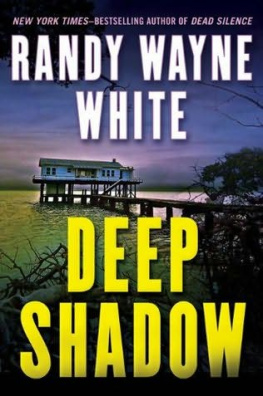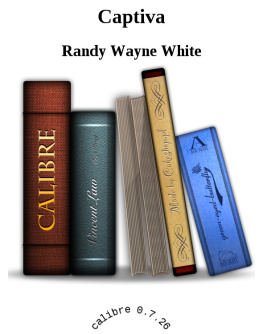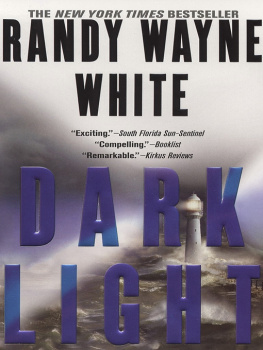Randy White - The Man Who Ivented Florida
Here you can read online Randy White - The Man Who Ivented Florida full text of the book (entire story) in english for free. Download pdf and epub, get meaning, cover and reviews about this ebook. genre: Detective and thriller. Description of the work, (preface) as well as reviews are available. Best literature library LitArk.com created for fans of good reading and offers a wide selection of genres:
Romance novel
Science fiction
Adventure
Detective
Science
History
Home and family
Prose
Art
Politics
Computer
Non-fiction
Religion
Business
Children
Humor
Choose a favorite category and find really read worthwhile books. Enjoy immersion in the world of imagination, feel the emotions of the characters or learn something new for yourself, make an fascinating discovery.

- Book:The Man Who Ivented Florida
- Author:
- Genre:
- Rating:4 / 5
- Favourites:Add to favourites
- Your mark:
- 80
- 1
- 2
- 3
- 4
- 5
The Man Who Ivented Florida: summary, description and annotation
We offer to read an annotation, description, summary or preface (depends on what the author of the book "The Man Who Ivented Florida" wrote himself). If you haven't found the necessary information about the book — write in the comments, we will try to find it.
The Man Who Ivented Florida — read online for free the complete book (whole text) full work
Below is the text of the book, divided by pages. System saving the place of the last page read, allows you to conveniently read the book "The Man Who Ivented Florida" online for free, without having to search again every time where you left off. Put a bookmark, and you can go to the page where you finished reading at any time.
Font size:
Interval:
Bookmark:
The Man Who Ivented Florida
Randy Wayne White
Here is land, tranquil in its beauty, serving not as the source of water but as the last receiver of it.
- Harry S. Truman (Address at dedication of Everglades National Park)Oh, goddamn it, we forgot the silent prayer!
- Dwight D. Eisenhower (at a cabinet meeting)PROLOGUE
The northern latitudinal line known as the 26th parallel bisects cities and countryside and rolling open ocean. It parallels the Tropic of Cancer in the Atlantic; it touches the Midway Islands of the Pacific. It joins unsuspecting villages such as the mangrove hamlet of Mango on Florida's west coast with uncaring cities such as the concrete tumult of Miami on Florida's east coast. The 26th parallel loops the earth, binding all sorts of things, linking the familiar with the exotic. As the earth spins, west to east, the line tracks the sun, creating a heat channel along the equator, so it is always hot and bright somewhere along its band.
The 26th parallel is no more important than any of the other latitudinal lines created by navigators, but it was of particular interest to meteorologists that autumn because of a strange thing that occurred in one of the parallel's regions, the Sahara Desert of North Africa. In September, a great wind began to blow over the desert. The wind was created by tropical air drawn to North Africa that sank, absorbed moisture, then shot skyward-a phenomena known as a Sahara High. A Sahara High is not unusual, but one that blows for more than a month is. The wind blew hot over Egypt, Libya, Algeria, and Morocco, gathering strength. It gusted, swirled, and grew into a withering gale that lifted sand-thousands of tons of sand-into the air. When the superheated wind, saturated with sand, collided with cooler air over the Canary Islands, there was a sustained explosion. The sand was blasted through the stratosphere into the mesosphere and was suspended there, fifty miles above the earth's surface. There, the sand granules attracted fugitive traces of vapor, creating noctilucent clouds-luminous formations that drifted seaward.
This glowing cloud mass, created by the great Sahara sandstorm, was visible to people in the unsuspecting villages and uncaring cities for thousands of miles along the western cusp of the 26th parallel. It was visible in Cairo and Casablanca and Las Palmas. It was visible to people living in the Azores, the Abacos, and on the peninsula of Florida, too; fragile land breaks immersed in the sea, and thus more intimately connected with the wider world. At sunrise, the sun burned through a glowing curtain of peach and rust. At sunset, the sand-laced eastern sky caught the light and reflected desert gold. At night, the clouds smoldered in the wind and throbbed with dull flame.
The extraordinary thing, though, was that only a small percentage of people living along the 26th parallel noticed. In North Africa, there were wars to consider, and there was also the damage caused by the sandstorm itself. In the Azores and Abacos, spectacular sunsets were nothing new, but satellite television reception was. Sunsets could not compete. The same was true in Florida, but on a richer scale. There was television, Nintendo, tourist traffic, air-conditioned malls, lottery tickets, Epcot, condo association meetings, greyhound races, cool, dark bars, and water beds. October in Florida is hot. People don't get out to look at the sky much.
A few did.
On a Thursday morning that October, in the Gulf Coast village of Mango, Tucker Gatrell stepped off the porch of his ranch shack and considered the sky. It was dawn and the eastern horizon was the smoky, iridescent color of a hot camp fire. "Holy Lordy," he said, touching his old horse, Roscoe, on the muzzle, "I ain't never seen nothing like that." Then he stood and looked for a while before saying, "Either the Everglades is on fire or they gone and blowed up Miami. Probably killed millions." When Roscoe shook his head and popped the ground with his hoof, Tucker said, "Me, too. I'm pulling it's Miami."
On that same morning, on the Loop Road in the belly of the Everglades, Ervin T. Rouse noticed the sky for the first time, and he went inside to get his fiddle. More than forty years before, Rouse had written a song titled "The Orange Blossom Special" and he sold all rights to a New York publisher for three hundred dollars. The song became world-famous; Rouse did not. But he still liked to play and write, and, man oh man, that sky deserved a song.
Thirty miles north, looking through a second-floor window of the Everglades Township Rest Home, Joseph Egret blinked his eyes when he saw the boiling crimson sky and sat down quickly on his bed. Them fat nurses, he thought to himself. Them fat nurses is giving me weird drugs. I gotta get out of this goddamn rest home.
Up and down Florida's west coast, people living on boats noticed the sky because people on boats don't have much else to do. A man named Tomlinson, who lived on a sailboat in Dinkin's Bay, Sanibel Island, saw the sky, and the beauty of it was like a sweet, sad weight that brought tears to his eyes. He sat on the bow of his boat in full lotus position, face to the sunrise, and began his morning meditation: This earth, this earth, so magic and so tragic. Magic and tragic
On another sailboat, anchored out in the same bay, Sally Car-mel was holding a mug of coffee, staring. The strange clouds, the bizarre fluorescence-it was so lovely, but what could cause such a thing? Along with a lifelong interest in birds, Sally had a minor in interior design, a master's degree in photojournalism, and she knew a great photographic opportunity when she saw one, so she hurried below to get her camera gear. She would skip her morning swim.
Living on a house on stilts in Dinkin's Bay, a man named Ford, who ran a small marine-specimen supply company, noticed the sky and puzzled over it. He moved around the boardwalk that fringed his house and looked again. He checked his watch, for he was a punctual man and eighteen petri dishes, already prepared with saline solution, waited for him in his lab. But this phenomenon-this flaming orange sky-invited thought, and Ford could not resist. From the bookcase beside the reading chair, he selected three books and began to read. Ten minutes later, he put two of the books away, still puzzled. He stood and went to the world globe in the corner and, from a book on meteorology, matched the wind-stream currents to the 26th parallel on the globe. It took him a while to assemble the possibilities, but then he smiled to himself and closed the book. "Sandstorm over the Sahara," he said aloud.
Then Ford put the book away and began his work in the lab.
ONE
Seen from a mile away, the sailboat was a solitary white husk suspended on space. Each day at sunset, a lone female figure appeared on the boat's deck, striped off T-shirt or bikini with a careless gesture, and dived into Sanibel Island's Dinkin's Bay.
It was something hard not to watch. But Marion Ford, who lived in a house built on stilts in the same bay, refused to watch. Not that he didn't want to. Oh, he wanted to, yet wouldn't allow himself-not since the first time when he stumbled upon the woman's ritual, scanning the bay with the Celestron telescope mounted on a tripod near his reading chair by the north window.
He'd seen the woman materialize out of the boat's companion-way, watched her stand at the taffrail with her back to him, peeling the shirt over her head-a woman he had never seen before on a boat he did not recognize. Ford had held his breath, eye to the telescope, some atavistic sense hoping, perversely, that she would not be as attractive as her hair and shoulders promised. Then his breath caught as she turned slowly, shaking amber hair down onto tanned shoulders, good strong face, long, long runner's legs, and the late sun glazing muscle cordage, rich body, and body hair in honey-shaded light.
Font size:
Interval:
Bookmark:
Similar books «The Man Who Ivented Florida»
Look at similar books to The Man Who Ivented Florida. We have selected literature similar in name and meaning in the hope of providing readers with more options to find new, interesting, not yet read works.
Discussion, reviews of the book The Man Who Ivented Florida and just readers' own opinions. Leave your comments, write what you think about the work, its meaning or the main characters. Specify what exactly you liked and what you didn't like, and why you think so.

